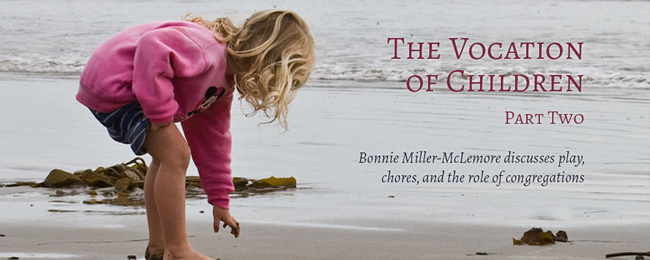
Janel Kragt Bakker, Associate Director of the Collegeville Institute, interviewed Bonnie Miller-McLemore, E. Rhodes and Leona B. Carpenter Professor of Pastoral Theology at the Divinity School of Vanderbilt University, on her work on children and vocation.
Bonnie is a member of the Collegeville Institute Seminar on Vocation across the Lifespan. This interview took place during the Seminar’s 2013 meeting on the vocation of children.
Read Part One of the interview here.
How would you describe the vocation of children?
 One thing that children do is form adults. That sounds backward; we tend to think that adults are responsible for the care and formation of children, and we are. But as I was working on In the Midst of Chaos, one of the most important insights I gained is how powerfully infants, toddlers, and children shape us as adults.
One thing that children do is form adults. That sounds backward; we tend to think that adults are responsible for the care and formation of children, and we are. But as I was working on In the Midst of Chaos, one of the most important insights I gained is how powerfully infants, toddlers, and children shape us as adults.
They help us see things we have never seen before. They renew our hope. They reinvigorate adulthood, which goes back to Eric Erikson’s idea that adults need to be needed. In response to the care of children, adults are formed themselves. That’s one vocational role or contribution that children make.
Today children also have real responsibilities that are related to their own work, which often has to do with school. That is a call to learn and continue to be formed as people in society.
Is play as part of a child’s vocation?
Definitely. That’s another way I was led into this interest in children and vocation, because play has sometimes gone hand-in-hand with the dichotomy between adults and children: adults work, children play.
Children have an ability to enter fully into play. A great deal their way of being in the world is determined through play. For example, adults get in a pool and they swim laps. Children get in a pool and they do all sorts of wonderful things with water.
Some people describe play as a means of learning, a way of practicing without consequence. You have freedom to experiment when you play. Children have real access to that freedom, in part because childhood is rightfully a period of suspended responsibility when it’s fully embraced. That’s not true of all contexts, since class and economics impact one’s freedom. But all children ought to be given that space.
Yet we shouldn’t idealize play or create a dichotomy in which children only play and adults only work. It’s richer to think of a continuum and a complexity around play and work that children and adults share together.
Are you a proponent of children doing chores? How do chores fit into children’s sense of vocation?
I think chores are difficult in today’s context because they can seem quite artificial and token. Because we live such a fast-paced, post-industrial life, it’s hard to see what they can contribute that is genuinely needed. I think chores have to be experienced by the child as a genuine contribution and participation, and not punitive and limited, to convey the sense that we have shared labor and shared responsibility of the house. It’s all of ours to care for.
You can see a contrast with other countries and cultures where children are brought into chores more fully in a way that doesn’t make them feel like they are made to do something arbitrarily. In many other cultures, chores are an important part of children entering into the family workload.
With spiritual formation, you don’t want to wait until your children are 12 and then think, we probably should be praying, because you’ve missed a window of opportunity. Chores are the same way. It is better to bring children in early and assume they’re going to be participants.
How do you think that adults should help children establish a sense of vocation?
I wish I had thought about this more as a parent of young children. My sons are in their twenties, and now I wonder if it would have been helpful for them to have been invited into more conversation about what they envisioned for their lives. I could have been more cognizant as a parent in helping my kids see that what they were doing both inside the household and outside the household – at school, or in the community, or in the church – as gifts and callings. Using that language might give greater blessing, sanction, or encouragement to help lift up their distinct gifts.
As parents, my husband and I were probably inadvertently conveying vocational aspirations to our sons of how to live a good life in relationship to others and to one’s own interests and gifts. I think about this more now because my children are at an age in which significant decisions are made: what degree program to pursue, or what job to take, or what relationship to enter into. It’s sometimes hard to take time to talk about those things as a family, but they’re so important.
What would be one or two things that you might say to parents of younger children about nurturing their children’s sense of vocation?
Try to leave a lot of space for children’s gifts – recognizing, affirming, welcoming, and cultivating their particular gifts. Sometimes these aren’t easy to recognize or see, but it is wise to invite and nurture and make space for them.
For example, one of my sons always had an interest in percussion. I didn’t really see percussion as an instrument, beyond making noise, though he eventually managed to commandeer a drum set. How can parents make space for things we know very little about? I think that parents have to be incredibly receptive.
What would you say to pastors, congregations, or religious communities about the vocations of children in their midst?
First, I would encourage them to enhance the visibility of children and to include children more fully in religious communities. In the last fifty years we’ve created children’s wings of Christian education that often take children out of congregational life. I’m not just talking about logistics and practices, but also a cognitive shift of seeing children as full participants. Sometimes our ability not to see children is striking. We miss how deeply they think, how much they’re engaging major life issues, how profound their insights can be, and how much they can contribute.
The second thing I would want pastors to realize is that their ministry to children is simultaneously a ministry to the adults. It’s ministry to the parents of those children. Whatever ministers or pastors can do to keep children and their parents involved with each other around faith issues, whether it’s by commissioning them to read scripture every day at the dinner table, or encouraging parents to meet their children around faith issues, is important.
The other adult population is the non-biological adults, what African-American communities call the “other mothers.” The rest of the congregation has a responsibility to be present to children, nurture them, and encourage their participation. Children need many adults. Congregations are probably one of the few remaining social institutions where generations can come together and where other adults can make a big difference in children’s lives.
Click here to read Part One of the interview with Bonnie Miller-McLemore.
Listen to the full interview:
Image “Kids playing in water” (cropped original) courtesy of Mike Baird, on Flickr via a Creative Commons License.
Like this post? Subscribe to have new posts sent to you by email the same day they are posted.



Leave a Reply